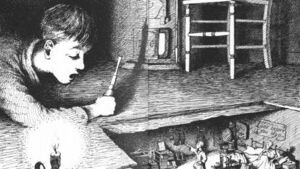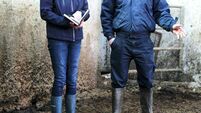Living Greener: Unexpected journeys of the imagination

An image from 'The Borrowers' by Mary Norton
EVERY evening and all weekend – every moment I’m not working – is just time for my daughter and myself to visit the neighbours, walk the woods, go fishing and do the chores around the homestead. Childhood disappears quickly, and I want to make sure I don’t miss a moment of it.
Every evening, though, ends the same way, with me reading stories to her. As she grew older, as readers often do, she became a storyteller, weaving her own worlds of fairies and magic.
She felt proud to have her own exclusive stories, but I told her she was part of an even greater story: the story of her own life. You will know it all one day, I told her, but it can never be told, only lived, and every day will be a new chapter.
One day, we talked about the fact that the puffins on our shores moo like cows – because they just weren’t comical enough already – and we decided it would be sweet if puffins and cows could talk to each other. Cows would never know how to swim in the sea or fly over cliffs, but puffins could tell them what it’s like, and cows could tell them about the green fields that the puffins might never see.
On the other hand, The Girl pointed out, if they are from different parts of the island, they would speak differently, although she allowed that a puffin could learn to speak with a cow accent.
At times our reading could veer off into whimsical discussions, such as what letters would taste like. We both agreed that A would taste like maple syrup, and The Girl seemed very sure that K would be crunchy and bacon-flavoured. When I brought up the letter T, we both responded at the same time: dry, salty crackers. I suggested M would be chocolate, but The Girl seemed quite certain it would taste of plums and blueberries.
Finally, we put different words together and tried to imagine the flavour combination.
The Girl was looking at one of her history books – at pictures of Vikings burning a village long ago – and grew pensive.
“Papa, if you could make it so everyone in the world would have to obey one person, who would it be?” Someone who would immediately give up that power, I said, and there aren’t many people like that.
“I thought if I had that kind of power, I would make everyone do only good things,” The Girl said.
Yes, but if you made everyone do that, you wouldn’t be good, I said.
We were reading , that charming book about tiny people living in the walls of Victorian-era London houses, and she wasn’t buying it.
“If they are so small, where do they get their clothes?” They must make them, I said, as everyone used to. We still do, a little: I have my sewing kit and patch your clothes.
“Then where do they get the knives to cut the clothes? Where do they get the patterns?” she asked in increasing frustration. The book, I said, says they stole pins and blades from the big people, and, of course, people did create their own clothes before they had patterns.
“Our knives would be far too large for them, and they’d need a whole set – they have to cut potatoes, too!” The Girl said with increasing exasperation.
I’m really proud of you for thinking about all the little details, I said, but sometimes you have to put things like that aside for a story. It’s called ‘suspension of disbelief’– you know, like when Jerry the Mouse hits Tom the Cat, and for a moment Tom’s head is completely flattened. His head wouldn’t really be that flat, but it makes a good story, I explained.
She wasn’t having it.
I want to cultivate such questions early, and acknowledge the limits of what I can answer, and help her find the answers on her own. Eventually, we returned to with pleasure, knowing that a new question would arise and take us on an unexpected journey, and it wouldn’t matter how long it took to finish the book.
Last night we couldn’t find the book at first, and my daughter exclaimed, “Maybe they Borrowed themselves!”





